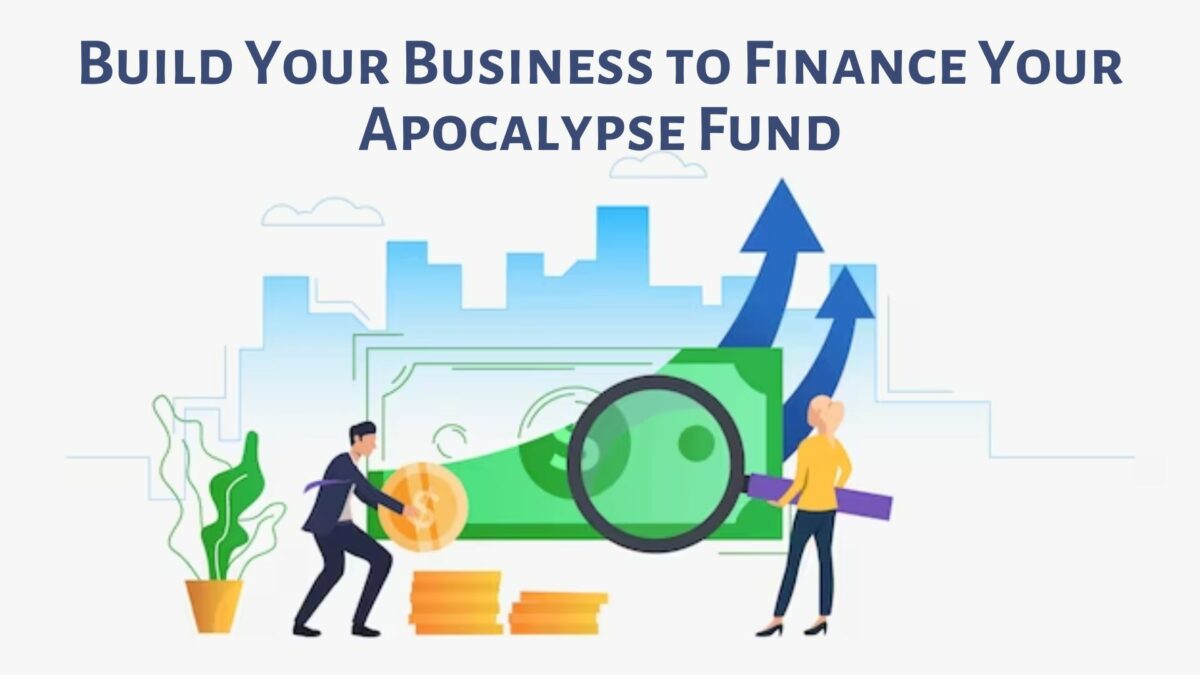Someday’ is a disease that will take your dreams to the grave with you.
–Tim Ferriss

Keep them away
Tim Ferriss recently appeared on the Hulu show A Day in the Life, and one of the snippets of his day was advising a startup which had recently won a competition (go to about 24:45 into the show). His advice was that if you are an entrepreneur and you are both provided an offer which can materially change your life and feel confident in your ability to generate more ideas and create new businesses, then you should take the offer.
Ferriss called this amount an apocalypse fund. To me, an apocalypse fund can mean a fund which, even if you never worked another day in your life, would fund a basic standard of living. It could be enough to ensure that you had a pretty good standard of living without working, but it’s not the type of fund that would allow you to purchase yachts and private jets and go port hopping from St. Tropez to Monaco to Ibiza for the rest of your life.
An entrepreneur who is faced with the opportunity to sell out for apocalypse fund money but not yacht club money faces an interesting dilemma. The entrepreneur has built up the business enough to where it has some value and growth prospects, which is why he’s being offered a buyout from someone else; however, because of those growth prospects, the entrepreneur is probably leaving money on the table if he takes the offer.
Here’s how I thought about my apocalypse fund offer when I was bought out of the company I co-founded.
- I remembered prospect theory, which states that a person will suffer more pain when losing money than joy when gaining the same amount. Even though my company was growing and had plenty of prospects for being worth more in the future than at the time I took the deal (those prospects turned out to be realized), I was fairly risk-averse, as I didn’t want to, at some future time, look back and rue not taking the deal.
- I maintained a reasonable minority stake in the company, meaning that if it continued to grow, I would get a piece of the action. I was, in effect, taking most of my winnings off of the table and playing with house money. If the equity stake wound up being worthless, then I would not be hurt by it, but if it wound up having any value, then I’d have gravy.
- I had confidence that I could build another business. Many of the steps that I took in building the one that I sold are replicable, and I certainly learned from my mistakes in building it. I have plenty of ideas, which I jot down in various places. However, if I try to build anything big, it will definitely be with the help of outside equity, since I now have established a track record.
- After, at that point, five and a half years, I was burned out in building a company revolving around something for which I had minimal passion. There was quite a value, to me, in taking a known amount in exchange for being able to start with something new.
- Having the apocalypse fund will allow me to be much more risk-seeking in the future. If presented with a similar opportunity in the future, I can stick around longer, trying to create and capture as much upside value as possible before selling. In other words, I can shoot for yacht and private jet money.
In summary, my decision to sell came down to building that apocalypse fund. I didn’t want to have the remorse of looking back at an opportunity to sell out if bad things happened in the future, although to this point, they have not. Just as having no mortgage payment creates a sense of security in your housing situation, having an apocalypse fund gives you a sense of security about the future and enables you to pursue new entrepreneurial ideas knowing that you’re not walking the tightrope without a net underneath you.
What would you do if you got an apocalypse fund offer? Tell us your thoughts in the comments below!
Author Profile
- John Davis is a nationally recognized expert on credit reporting, credit scoring, and identity theft. He has written four books about his expertise in the field and has been featured extensively in numerous media outlets such as The Wall Street Journal, The Washington Post, CNN, CBS News, CNBC, Fox Business, and many more. With over 20 years of experience helping consumers understand their credit and identity protection rights, John is passionate about empowering people to take control of their finances. He works with financial institutions to develop consumer-friendly policies that promote financial literacy and responsible borrowing habits.
Latest entries
 Low Income GrantsSeptember 25, 2023How to Get a Free Government Phone: A Step-by-Step Guide
Low Income GrantsSeptember 25, 2023How to Get a Free Government Phone: A Step-by-Step Guide Low Income GrantsSeptember 25, 2023Dental Charities That Help With Dental Costs
Low Income GrantsSeptember 25, 2023Dental Charities That Help With Dental Costs Low Income GrantsSeptember 25, 2023Low-Cost Hearing Aids for Seniors: A Comprehensive Guide
Low Income GrantsSeptember 25, 2023Low-Cost Hearing Aids for Seniors: A Comprehensive Guide Low Income GrantsSeptember 25, 2023Second Chance Apartments that Accept Evictions: A Comprehensive Guide
Low Income GrantsSeptember 25, 2023Second Chance Apartments that Accept Evictions: A Comprehensive Guide

